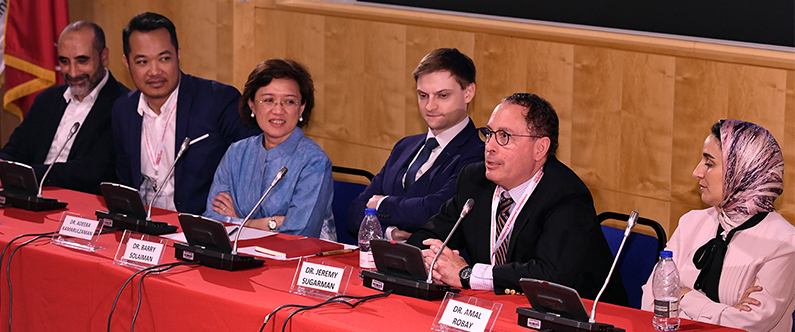WCM-Q explores law and ethics of stem cells and AI in medicine
 Speakers at WCM-Q’s Law and Medicine event take part in a panel discussion.
Speakers at WCM-Q’s Law and Medicine event take part in a panel discussion.
The legal and ethical implications of using stem cells and artificial intelligence (AI) in medicine were discussed at the latest installment of Weill Cornell Medicine-Qatar’s (WCM-Q) Intersection of Law & Medicine series.
Expert speakers at the event discussed the impact of recent advances in stem cell science and AI on the practice of medicine in Qatar and explored how new legal frameworks could be developed to protect the rights and safety of patients in the MENA region. The day-long event was organized by WCM-Q in collaboration with Hamad Bin Khalifa University and the University of Malaya of Kuala Lumpur, Malaysia.
Stem cells are an exciting area for medical researchers because they have the potential to repair damaged or diseased tissues in people with conditions such as Parkinson’s disease, type 1 diabetes, stroke, cancer, and Alzheimer’s disease, among many others. Stem cells can also be used by researchers to test new drugs for safety and effectiveness.
WCM-Q’s Dr. Amal Robay, WCM-Q assistant professor in genetic medicine and director of research compliance, said: “Stem cells have the capacity for unlimited or prolonged self-renewal, and they can differentiate themselves into many different cell types to become tissue- or organ-specific cells with special functions.” The central ethical dilemma of stem cell science arises from the fact that embryonic stem cells are derived from human embryos or by cloning, she explained.
Visiting bioethics expert Dr. Jeremy Sugarman of Johns Hopkins University in Baltimore, US said that the public image of stem cell research had been damaged by a small number of high-profile cases in which scientists had behaved unethically. The field had also been hampered by different countries applying different laws to stem cell research, making international collaboration problematic, he said.
Meanwhile, the use of AI in healthcare has the potential to leverage analysis of large amounts of data to improve patient outcomes, but poses ethical concerns regarding privacy, the diversity of data sources, biases and relying on non-human entities for potentially life-changing decisions.
Dr. Barry Solaiman, assistant professor of law in the College of Law and Public Policy at HBKU said: “It’s very important that we bridge that gap between the professions of law and medicine, and that we understand the fundamental importance of ethicists to the advance of science. We need to consider how lawyers can help to develop laws to ensure that science advances and that it does so in ways that protect everyone involved.”
The event, which was co-directed by Dr. Solaiman and Dr. Thurayya Arayssi, professor of clinical medicine and senior associate dean for medical education and continuing professional development at WCM-Q, also featured other expert speakers. Dr. Mohammad Firdaus Bin Abdul Aziz of the Faculty of Law at the University of Malaya, who spoke about stem cell regulations around the world, Dr. Faisal Farooq of Qatar Computing Research Institute, who spoke about AI in healthcare, Dr. Effy Vayena of the Swiss Institute of Technology on the ethical challenges of using machine learning in healthcare, Dr. Sharon Kaur of the Faculty of Law at the University of Malaya on global regulation of AI, and Dr. Mohammed Ghaly of Qatar Faculty of Islamic Studies on Islamic perspectives of bioethics in stem cell research. The visiting experts also engaged in two panel discussions, one examining the law and ethics of stem cell science, chaired by Dr. Adeeba Kamarulzaman, dean of medicine at the University of Malaya, and one on AI in healthcare chaired by Dr. Thurayya Arayssi, professor of clinical medicine and senior associate dean for medical education and continuing professional development at WCM-Q.
Dr. Arayssi said: “I am very grateful that our expert speakers joined us to explore how legal frameworks can be developed to maximize the benefits of advances in stem cell research and AI for patients, while also respecting the rights, safety and cultural traditions of the everyone in the community.”
The event was accredited locally by the Qatar Council for Healthcare Practitioners-Accreditation Department (QCHP-AD) and internationally by the Accreditation Council for Continuing Medical Education (ACCME).
